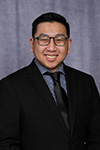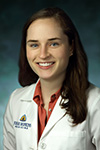The overall purpose of the Ambulatory Care Pharmacy Residency Program is to develop competent, confident, and empathetic ambulatory care practitioners who are also prepared to become a clinical track faculty or adjunct faculty member in a college of pharmacy.
This three-minute video provides a detailed overview of the PGY-2 Ambulatory Care Pharmacy Residency Program available through a partnership between the University of Maryland School of Pharmacy and the University of Maryland Medical Center, and includes information about what residents can expect to learn during their time in the program.
In this American Society of Health-System Pharmacists (ASHP)-accredited residency program, practice opportunities are available in general and specialty clinics in a collaborative practice environment throughout the Baltimore area to direct patient-care services that optimize medication therapy.
The University of Maryland is conveniently located on an interprofessional medical campus with access to rotation sites both at the University of Maryland Medical System outpatient practices, the Baltimore Veteran’s Affairs Medical System, and the Johns Hopkins Hospital. This allows the resident to train at a variety of innovative rotation sites.
This program emphasizes expanding the roles of clinical pharmacy, disseminating clinical research, and professional leadership. After completing this PGY2 Residency Program, the graduate will be well positioned for careers in ambulatory care clinical pharmacy and academia. The resident will have the opportunity to collaborate with faculty with various research expertise within the school of pharmacy to conduct a clinical, humanistic, or economic outcomes analysis of an ambulatory care service.
At the University of Maryland, School of Pharmacy, the resident gains experience in didactic teaching and experiential precepting. The resident participates in the Education Theory and Practice course and completes the teaching certificate program. This includes developing large group lectures, small group active learning sessions, and precepting students. Given the interprofessional nature of many of the rotation sites, the resident will also have opportunities to educate health care professionals and trainees from other disciplines.
Recent Residents:
| Recent Resident | |
|---|---|
|
Amy Hu, PharmD
|
|
 |
Vincent Lam, PharmD
|
 |
Connie Liang, PharmD
|
 |
Nabila Faridi, PharmD
|
 |
Ebony Evans, PharmD
|
 |
Abby Klutts, PharmD, BCACP
|
 |
Christine Dimaculangan, PharmD, BCACP
|
 |
Paul Solinsky, PharmD, BCACP
|
As part of its accreditation by the American Society of Health-System Pharmacists (ASHP), this program is committed to the following general purpose:
Postgraduate Year 2 (PGY2) pharmacy residency programs build on Doctor of Pharmacy (PharmD) education and Postgraduate Year 1 (PGY1) pharmacy residency programs to contribute to the development of clinical pharmacists in specialized areas of practice. PGY2 residencies provide residents with opportunities to function independently as practitioners by conceptualizing and integrating accumulated experience and knowledge and incorporating both into the provision of patient care or other advanced practice settings. Residents who successfully complete an accredited PGY2 pharmacy residency are prepared for advanced patient care, academic, or other specialized positions, along with board certification, if available.
Additionally, our program adheres to the "Goals and Objectives for a Post-Graduate Year Two Program in Ambulatory Care" set forth by ASHP. These goals and objectives can be found in the ASHP Residency Accreditation Regulations and Standards.
Learning Experiences:
Required Rotations:
- Antithrombosis Clinic (University of Maryland Medical Center)
- Cardiology Clinic (Veteran’s Affairs Medical Center)
- Center for Diabetes and Endocrinology (University of Maryland – Midtown Campus)
- Center for Infectious Disease/HIV Clinic (University of Maryland – Midtown Campus)
- Family Medicine Clinic (University of Maryland Medical Center)
- Pediatric Gastroenterology Clinic (University of Maryland Medical Center)
- Pulmonology (Baltimore Washington Medical Center)
- Transitions of Care (University of Maryland Medical Center)
Elective Rotation Opportunities:
Each resident will have the opportunity to customize his or her residency experience with the program coordinators. Some of the available opportunities include:
- Center for Successful Aging (MedStar Health)
- Home Based Medication Management (Johns Hopkins Medical System)
- Neurology (University of Maryland Medical Center)
- Oncology / Hematology (University of Maryland Medical Center)
- Population Health (University of Maryland School of Pharmacy)
- Post-Acute COVID (Johns Hopkins Medical System)
- Solid Organ Transplant (University of Maryland Medical Center)
Other Required Activities:
- Orientation Experience
- Teaching Experience
- Administration & Leadership
- Pharmacy Dispensing & Staffing
- Research Project & Manuscript Development
Number of Available Positions: 1
Application Process:
The application deadline is January 2.
Applicants must possess a PharmD degree and have completed an ASHP-accredited residency in pharmacy practice. The resident will be required to become a licensed pharmacist in the state of Maryland.
Applications for this program will only be accepted through PhORCAS. Reference writers should use the standard reference template in PhORCAS.
Application requirements:
- Letter of intent
- Curriculum vitae
- Letters of recommendation (3)
- Official transcripts
International students and permanent residents should contact P-SHORResidencyandAdministrativeSupport@rx.umaryland.edu before applying.
Residents who match to this program will be required to come to Baltimore in advance of the July 1 start date for campus orientation; these orientation dates are not known until mid-spring. These sessions are typically offered on select Mondays in May and June.
Program Director:
Kathleen Pincus, PharmD, BCPS, BCACP, CDCES
Director, Ambulatory Care Pharmacy Residency
Associate Professor of Practice, Sciences, and Health Outcomes Research
University of Maryland School of Pharmacy
20 N. Pine Street, Room N425
Baltimore, MD 21201
Phone: 410-706-5843
Email: kpincus@rx.umaryland.edu
Program Coordinator:
Seferina Kim, PharmD, BCPS
Coordinator, Ambulatory Care Pharmacy Residency
Clinical Pharmacy Specialist
University of Maryland Medical Center
Phone: 410-328-1850
Email: Seferina.kim@rx.umaryland.edu
